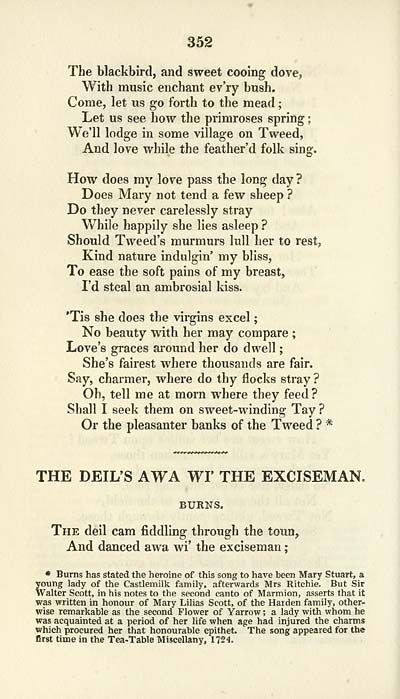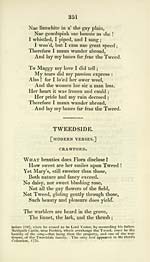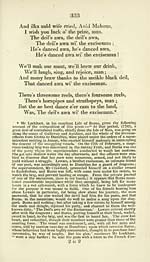Glen Collection of printed music > Printed text > Scottish songs > Volume 2
(52) Page 352 - Deil's awa wi' the exciseman
Download files
Complete book:
Individual page:
Thumbnail gallery: Grid view | List view

352
The blackbird, and sweet cooing dovej,
With music enchant ev'iy bush.
Come, let us go forth to the mead ;
Let us see how the primroses spring ;
We'll lodge in some village on Tweed,
And love while the feather'd folk sing.
How does my love pass the long day?
Does Mary not tend a few sheep ?
Do they never carelessly stray
While happily she lies asleep ?
Should Tweed's murmurs lull her to rest,
Kind nature indulgin' my bliss,
To ease the soft pains of my breast,
I'd steal an ambrosial kiss.
'Tis she does the virgins excel ;
No beauty with her may compare ;
Love's graces around her do dwell ;
She's fairest where thousands are fair.
Say, charmer, where do thy flocks stray ?
Oh, tell me at morn where they feed ?
Shall I seek them on sweet-winding Tay ?
Or the pleasanter banks of the Tweed ? *
THE DEIL'S AWA WF THE EXCISEMAN.
BURNS.
The deil cam fiddling through the toun,
And danced awa wi' the exciseman ;
♦ Burns has stated the heroine of this song to have been Mary Stuart, a
young lady of the Castlemilk family, afterwards Mrs Ritchie. But Sir
Walter Scott, in his notes to the second canto of Marmion, asserts that it
was written in honour of Mary Lilias Scott, of the Harden family, other-
wise remarkable as the second Flower of Yarrow ; a lady with whom he
was acquainted at a period of her life when age had injured the charms
which procured her that honourable epithet. The song appeared for the
first time in the Tea-Table Miscellany, 1724.
The blackbird, and sweet cooing dovej,
With music enchant ev'iy bush.
Come, let us go forth to the mead ;
Let us see how the primroses spring ;
We'll lodge in some village on Tweed,
And love while the feather'd folk sing.
How does my love pass the long day?
Does Mary not tend a few sheep ?
Do they never carelessly stray
While happily she lies asleep ?
Should Tweed's murmurs lull her to rest,
Kind nature indulgin' my bliss,
To ease the soft pains of my breast,
I'd steal an ambrosial kiss.
'Tis she does the virgins excel ;
No beauty with her may compare ;
Love's graces around her do dwell ;
She's fairest where thousands are fair.
Say, charmer, where do thy flocks stray ?
Oh, tell me at morn where they feed ?
Shall I seek them on sweet-winding Tay ?
Or the pleasanter banks of the Tweed ? *
THE DEIL'S AWA WF THE EXCISEMAN.
BURNS.
The deil cam fiddling through the toun,
And danced awa wi' the exciseman ;
♦ Burns has stated the heroine of this song to have been Mary Stuart, a
young lady of the Castlemilk family, afterwards Mrs Ritchie. But Sir
Walter Scott, in his notes to the second canto of Marmion, asserts that it
was written in honour of Mary Lilias Scott, of the Harden family, other-
wise remarkable as the second Flower of Yarrow ; a lady with whom he
was acquainted at a period of her life when age had injured the charms
which procured her that honourable epithet. The song appeared for the
first time in the Tea-Table Miscellany, 1724.
Set display mode to: Large image | Transcription
Images and transcriptions on this page, including medium image downloads, may be used under the Creative Commons Attribution 4.0 International Licence unless otherwise stated. ![]()
| Special collections of printed music > Glen Collection of printed music > Printed text > Scottish songs > Volume 2 > (52) Page 352 - Deil's awa wi' the exciseman |
|---|
| Permanent URL | https://digital.nls.uk/90426560 |
|---|
| Shelfmark | Glen.105a |
|---|---|
| Additional NLS resources: | |
| Attribution and copyright: |
|
| Description | Scottish songs and music of the 18th and early 19th centuries, including music for the Highland bagpipe. These are selected items from the collection of John Glen (1833 to 1904). Also includes a few manuscripts, some treatises, and other books on the subject. |
|---|
| Description | The Glen Collection and the Inglis Collection represent mainly 18th and 19th century Scottish music, including Scottish songs. The collections of Berlioz and Verdi collected by bibliographer Cecil Hopkinson contain contemporary and later editions of the works of the two composers Berlioz and Verdi. |
|---|

